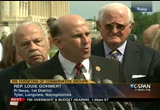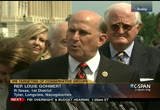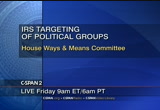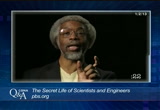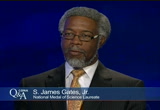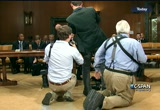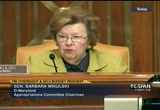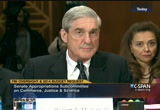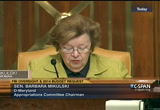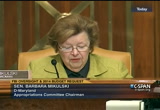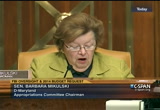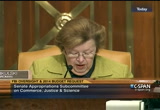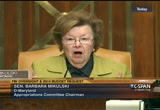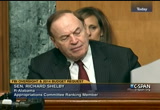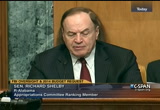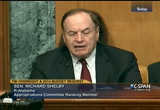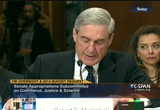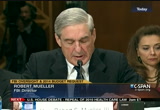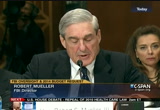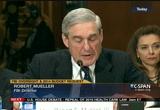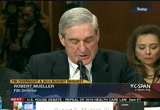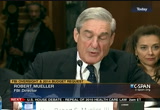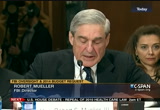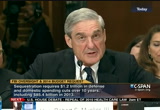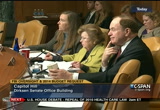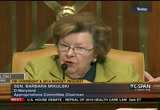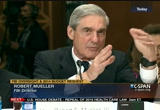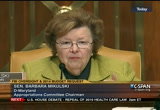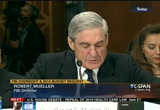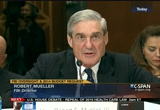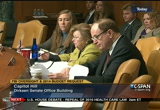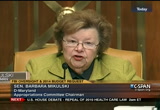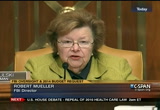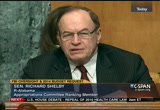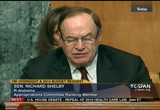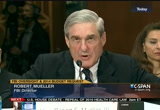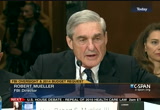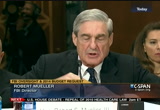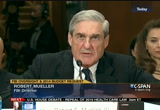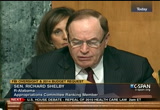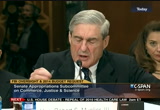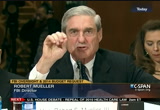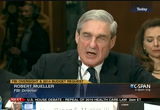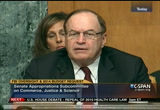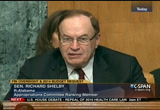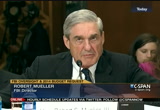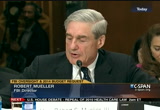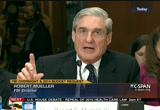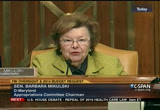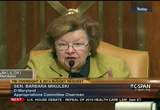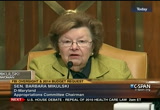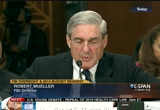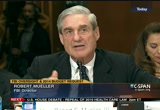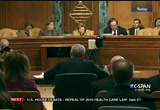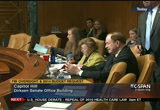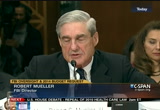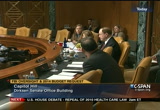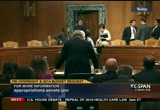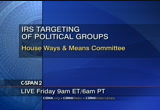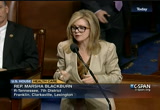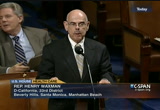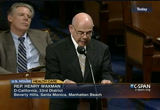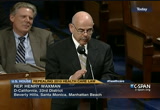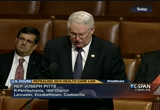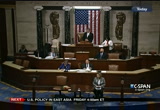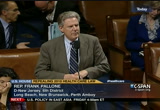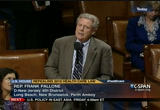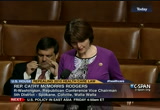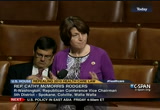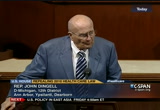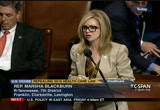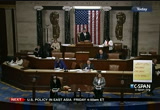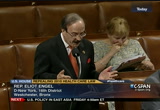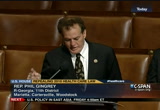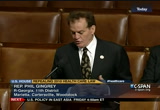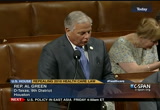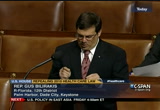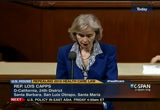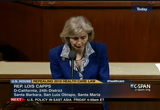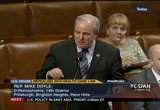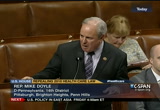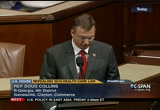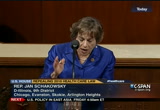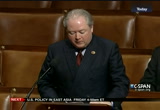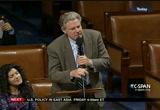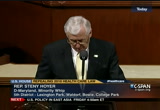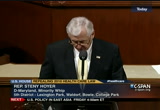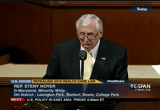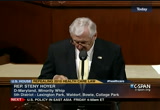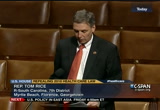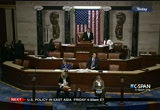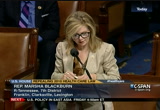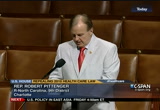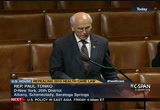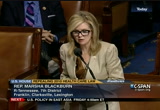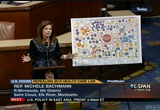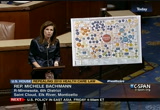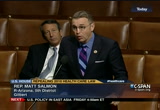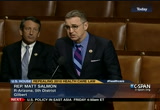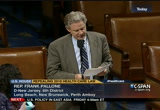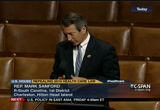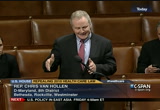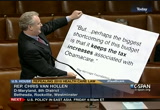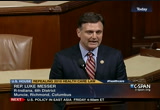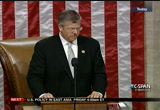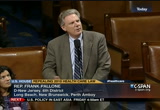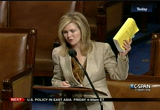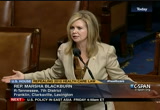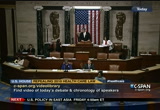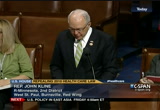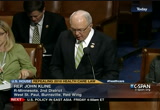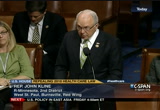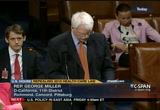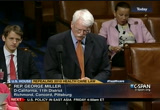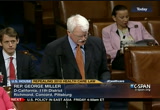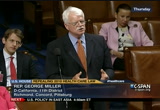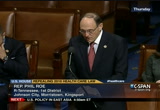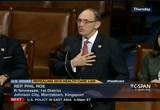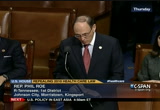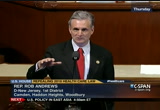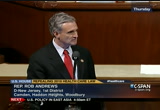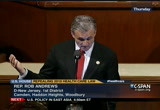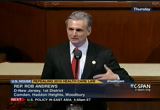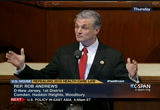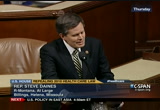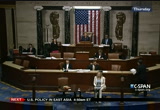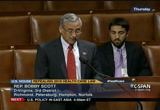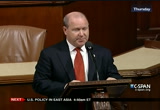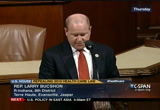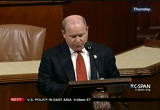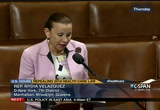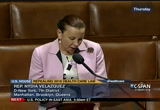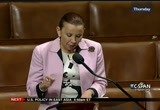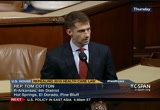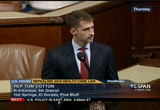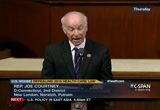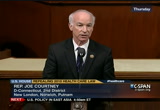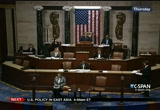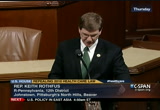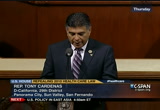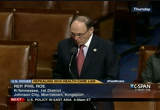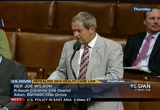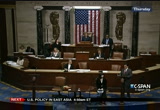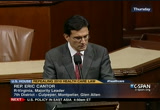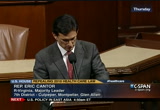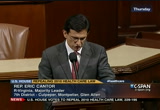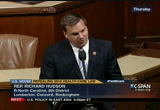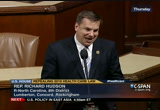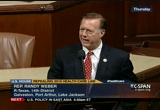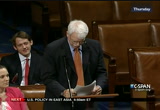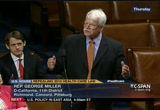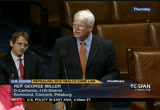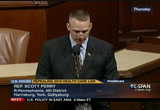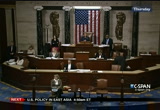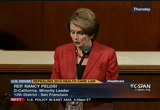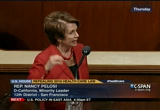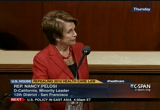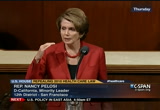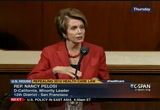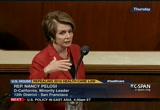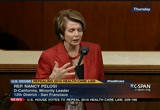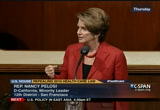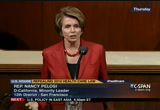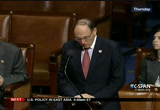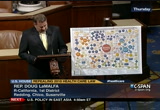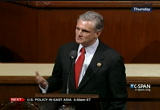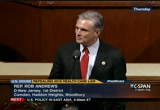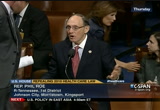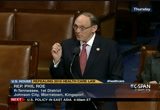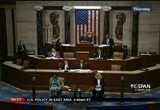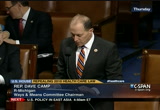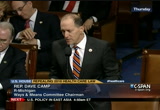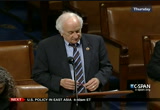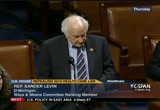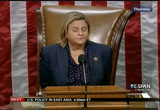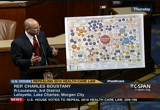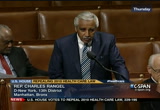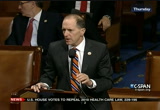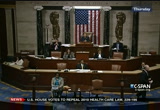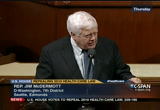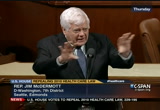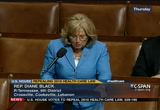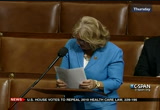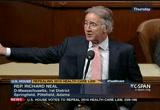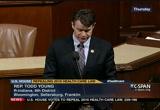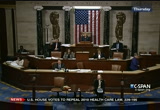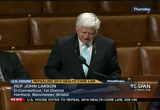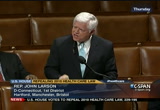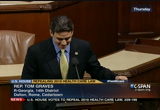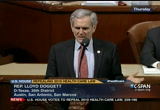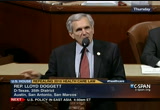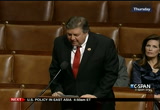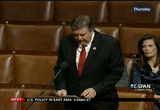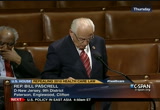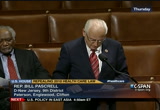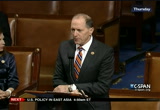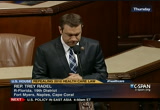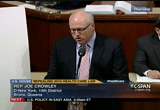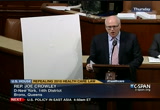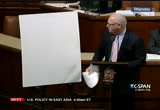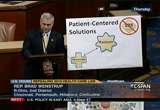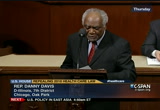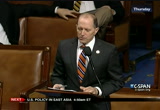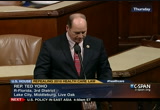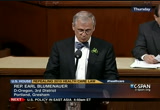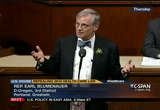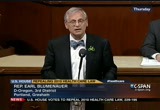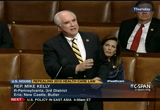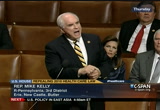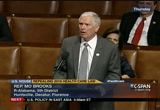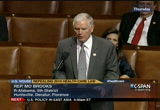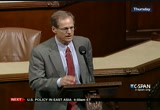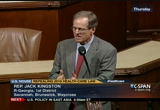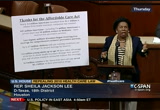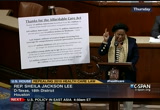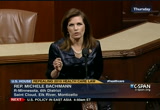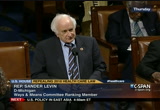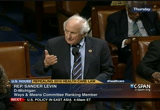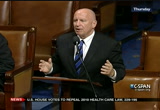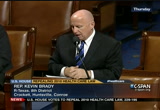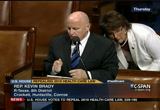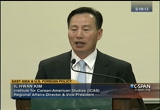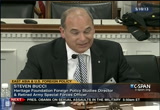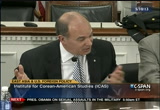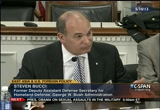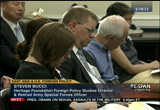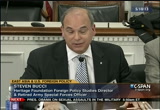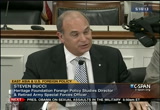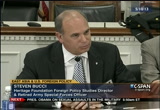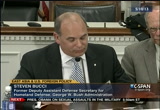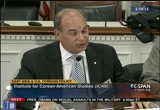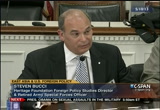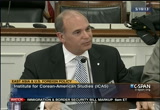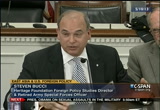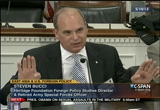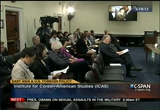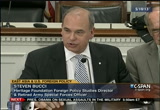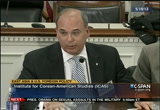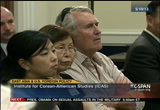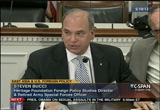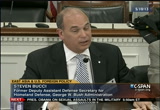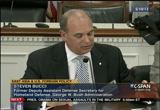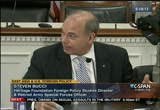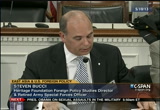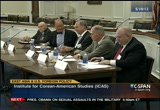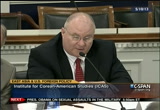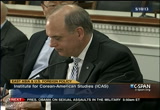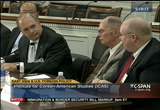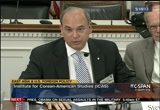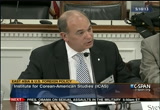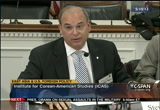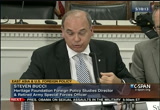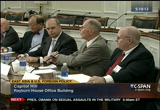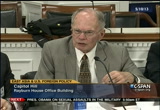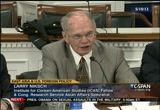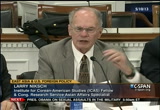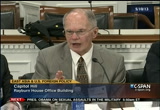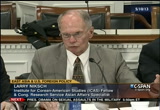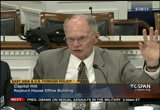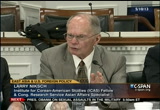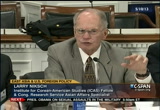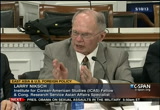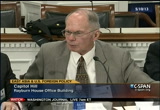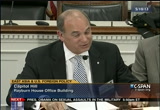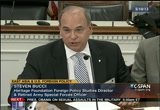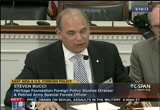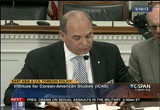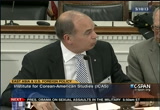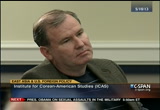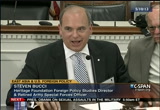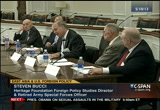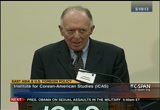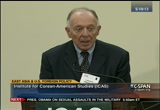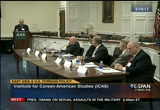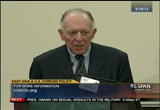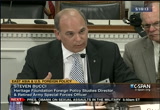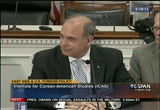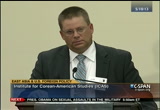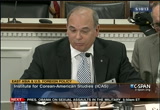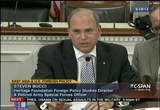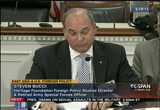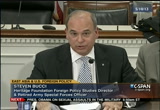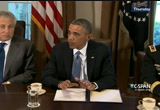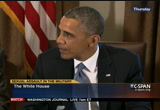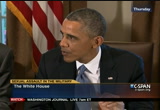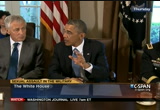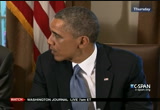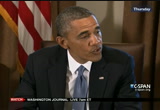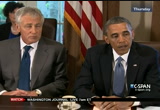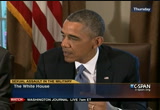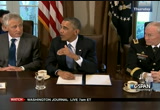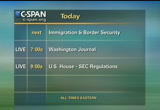tv Capitol Hill Hearings CSPAN May 17, 2013 1:00am-6:01am EDT
1:00 am
happened? you have a government that is forcing people to get a legal status in order to come up here and have their voices heard. once they force you into this funnel having that legal status, then they use that to intimidate and abuse to prevent opposite views from being heard. this is a government run amok. if the ap has taught you anything, it should be to the media -- you will be used for a while and then when you're no longer needed, you'll be pressured and put out of business as well. this is a very dangerous time. it is interesting question. why would you want legal status? this is the way of tyrannical government perpetuates itself.
1:01 am
>> again, i want to remind that later we have even more emphasis than ever to repeal obamacare. any people have said this issue is dead. many people have said that obamacare is here to stay. we are here as the people's representatives, as real people from across united states to say that this issue is now revived. it is back on the table. we fully believe american theye will demand because have seen the abuse of power from this administration and a full-scale of the repeal of obamacare. we believe the heat will become so hot that even the president of the united states will be forced to repudiate his signature budgets are -- budget
1:02 am
legislation. we make available to all of the members members of the united states congress. we have much to send this issue. many to party organizations have been hurt and abused. take advantage to speak with these people directly. we're super coming today. -- thank you for coming today. and meansse ways committee holds a meeting on the internal revenue service targeting of political groups. members will hear from the treasury department's inspector general for tax ministration and outgoing irs commissioner. live coverage of the hearing on c-span 2 at 9 a.m. eastern. you can read the inspector general's report on the internal revenue service online at c- span.org. on the next "washington journal" we will discuss the
1:03 am
irs targeting of conservative --ups with republican representative charles boustany from louisiana. ps onepresentative lois cap affordable care act. "washington journal" live at 7 a.m. eastern. >> how do you feel about describing site is in 30 seconds? -- science in 30 seconds? >> added something go from this big kidnapping? if you do this process 10 times, you get the atom. 35 times. we have new instruments -- no
1:04 am
instruments to measure that. people like me have been working on a piece of mathematics old string theory, superstring theory to answer that. i tried. is often asked by people that i'm a theoretical physicist, what does your husband actually do question mark -- actually do? i prefer to tell mr. as the following. most people know what a novelist does. they take words and sentences and make characters until stores. being a theorist is the same thing except we use mathematics to tell our stories. if we're good at at what we do, our stories explain something that happens in nature. take what you saw a few moments ago of a 32nd soundbite describing bite.second sound out -- >> more with national medal of
1:05 am
1:06 am
>> good morning, everybody. today, the subcommittee amendment, the congress justice will hear from the director fbi robert mueller about the fbi's budget and its priorities for fiscal 2013. the process today will be in an open public hearing and then we will move to a classified meeting to go over other aspects relating to our global war against terrorism. we want to welcome director mueller.
1:07 am
he will be the longest-serving fbi director since j edgar hoover when he retires in september. he is the only director to serve out a full 10-year term, plus an additional two. thank you for your service. we want to thank you for leading the fbi. thank you for staying an additional two years as we move into a new enduring war, the cybersecurity aspect. we also want to thank you for being one of those nighthawk people who were always available 24/7. that is the nature of threats we face in our country, and around the world. you have transformed the fbi. while maintaining a vigorous domestic law enforcement agency,
1:08 am
there has been the evolution to deal with the predatory threats. we will listen to your testimony today about what we need to make sure the fbi is the premier federal law enforcement agency in the united states of america and the world. we know there are many eyes on the fbi right now, particularly those related to the boston marathon bombing. all of us at the fbi mourn what happened there. four marylanders were injured, one a 29-year-old preschool teacher. she lost a leg. she has not lost her spirit.
1:09 am
she was there with her mother, her sister, and her sister's husband. all the family members suffered some form of entry. every family has got a story. we want to thank those who responded, drove the response, and there was a coordinated law- enforcement effort. i know we will be talking and there will be questions about that, particularly in terms of the authorities the fbi needs to do its job, to be able to prevent such things from happening, the resources necessary to do the important work, and any investigatory gaps. while all eyes are on boston, all eyes are on the fbi also. i was struck by the last couple of days. the plane explosion in texas, a melancholy event, was an act of
1:10 am
predator or an accident? the three kidnapped girls from ohio, the fbi involved there. that big $45 million atm heist, which was exposed, $45 million in an international coordinated effort, and all the same time going after everything from other bank robbers to those who have a predatory intent to our country. we want to listen to the issues facing the fbi. we are concerned about the budget. the president's request is at $8.4 billion. we know the fbi, the appropriation was enacted at $8.1 billion, but after the sequester, $7.5 billion.
1:11 am
we are concerned if the sequester continues in 2014, there will be an additional $700 million cut to the fbi. it is a stunning amount of money, particularly when you look at the incredible things the fbi needs to do. the president has increased the appropriations request for new major programs. one, cyber, $87 million, anticipating the need for expanding the national criminal background checks, $100 million for new people, $7.4 million for biometrics technology, an important facility in alabama. he has maintained support for critical programs, but they are
1:12 am
flat funded. counterterrorism, violent crime, the exploitation of children, which i know you have been an enormous advocate, and the protecting of civil rights by investigating hate crime and the despicable practice of human trafficking. we are concerned about production, like eliminating the national gang intelligence center and the consequences of that. mr. director, we are looking forward to hearing what the request will be, and we also welcome you to comment on the sequester today and what would be the consequences to the fbi if the sequester continues in 2014. i will ask my entire statement be included in the record and i turn to my vice-chairman, senator shelby. >> thank you.
1:13 am
director mueller, we thank you for joining us again. we want to thank you for your service to the country. we are all indebted to the fbi for the sacrifices they and their families make. since the attacks of september 11, the fbi has been tasked with additional national security responsibilities. today, the fbi's mission includes protecting the united states against acts of terror, cyber crime, while simultaneously maintaining focus on traditional criminal activities, such as violent crime, public corruption, and white-collar crime. criminals and terrorists are increasingly agile and sophisticated. the constantly changing
1:14 am
landscape of criminal activity at home and abroad has challenged the bureau's ability to quickly respond to emerging threats. in recent years, we have seen threats arise in home mortgages, cyber security, and terrorism. it will not stop there. i believe new, unimagined threats will challenge the fbi and all of us in the future. to remain effective, it is imperative the bureau have the inherent capability to retool and refocus to address these threats. without a plan to address the threats, the fbi will continue to lurch from crisis to crisis, which is something none of us want to happen. in the past, the bureau has received additional resources from the congress, precisely because it has not been agile enough to refocus its efforts internally. this is not an effective way to address such pressing issues. the fbi request for 2014 is $8.3 billion.
1:15 am
the budget request maintains core missions. i think it lacks focus on how the bureau will address future, unexpected threats i just mentioned. recognizing the world in which we live and the tough fiscal climate, i am concerned the budget priorities reflected in this request do not always ensure the bureau is effective and nimble for the foreseeable future. i am committed and i know the chairperson is to working with you and others. the budget limited resources in a manner that safeguards taxpayers, while preserving public safety. i look forward to hearing from you about the bureau's budget and its priorities.
1:16 am
i am also interested in hearing about the fbi's work, pre-and post-boston bombing. they have obtained the telephone records of the "associated press" journalist. while i appreciate this as an ongoing investigation, i hope you will be at forthcoming as possible in addressing the issue here today. thank you. >> thank you and good morning, chairwoman mikulski, ranking member shelby, and members of the subcommittee. i served over a time on this subcommittee. i want to thank you for the opportunity to appear here today. on behalf of the men and women on the fbi, let me begin by thanking particularly you two for your continuing support over
1:17 am
together. we live in a time of diverse and persistent threats from terrorists and cyber criminals. we face a wide range of criminal threats from white-collar crime to public corruption, to migrating gangs and child predators. just as our national security and criminal threats evolve, so reats.he fbi counter these today, i would like to highlight several of the fbi's highest priority national security criminal threats. i will start with boston. the terrorist threat against the united states remains our top priority. we have seen an extraordinary effort by law enforcement and agencies to find and hold accountable those responsible for the boston bombings. one of the bombers is dead. a suspect has been charged and
1:18 am
we continue in our efforts to identify any others who may be responsible. the collaborative efforts of all of our partners have led to the results so far. let me assure you there will be no pause in the effort. there are limits to what we can discuss publicly in the case today as the investigation is active and ongoing. we face a continuing threat from homegrown violent extremists and they present unique challenges because they do not share a typical profile. their experiences and motives are often not distinct, which makes them very difficult to identify and stop. at the same time, foreign terrorists strike us home and abroad. terrorists operate in a wider range of targets than they did a
1:19 am
decade ago. we have seen an increase in terrorist groups and evolution in their tactics. core al qaeda is weaker and decentze years ago and it rnsted to attae west. al qaeda surrogates pose a continuing and growing threat. in light of the recent attacks on north africa, we must focus on emerging extremist groups carrying out additional attacks. next, let me turn to discuss the cyber threat, which has evolved significantly over the past decade and cuts across all fbi programs. cyber criminals have become increasingly adept at exploiting weaknesses in our computer networks and once inside, they can get state and trade secrets. we also face consistent threats from hackers for profit, organized criminal cyber syndicates and hacking groups. the cyber threat may well
1:20 am
eclipse the terrorist at in response, we are strengthening our capabilities. the cyber division is focused on computer intrusions and network attacks. fbi special agents work side-by- side with local counterparts on cyber task forces in each of our 56 field officers working to detect and disrupt. we have increased and desk the size and scope of the task force, which brings together 19 law enforcement, military, and intelligence agencies to stop current attacks and prevent future attacks. together with dhs and nsa, we have clarified the lanes in the road for our collective response.
1:21 am
cyber crime, as many other global crimes today, requires a global approach. we are coordinating investigations with international counterparts. we have special agents embedded with the police departments in ukraine to identify emerging trends and key players. at the same time, we fully recognize the private sector is the essential partner to protect our critical infrastructure and share threat information in particular. let me turn for a moment to the fbi's criminal programs. the fbi's responsibilities range from complex white-collar fraud to transnational enterprises, from violent crime to corruption. given limited resources, we must focus on the areas where we bring something unique to the
1:22 am
table. for example, violent crime and gang activity continue to exact a high toll on our communities. through safe streets and safe trails, we identify and target the most dangerous of these enterprises. to track and disrupt violence on the southwest border, we rely on our partnerships with the dea, and the el paso intelligence center. at the same time, we are required to and must remain vigilant in our efforts to find and stop child predators. our mission is threefold -- first, to decrease the vulnerability of children to exploitation, second, to provide a rapid decline to our children, to the programs such as our child deployment teams, and
1:23 am
third, to enhance the capabilities of state and local law enforcement to task force initiatives. in closing, i would like to turn to sequestration. the impact of sequestration on the fbi's ability to protect the nation from terrorism and crime will be significant. in fiscal year 2013, the fbi's budget was cut by more than $550 million. proposed cuts will total more than $700 million. not to mention in 2013, approximately additional $160 million. this will result in 220 vacancies in the fbi by the end of the fiscal year, with 1200 additional vacancies in 2014. we also anticipate furloughs for our employees during the next fiscal year.
1:24 am
i have long said people are the bureau's greatest asset. cuts and furloughs will limit the fbi's ability to prevent crime and terrorism, which will impact the safety and security of our nation. with regard to nonpersonnel resources, the fbi will have to forgo or delay long needed i.t. upgrades, and will be unable to maintain the technical surveillance tools needed. we understand the need for budget reductions but we would like to work with the subcommittee to mitigate the most significant impacts. chairman, ranking member shelby, i would personally like to thank you again for your support to the bureau over the years that i have been director and for your support of our office.
1:25 am
our sfon over the past decade would not have been possible without your cooperation and support. for that, we thank you. i look forward to any questions you may have. >> thank you. i anticipate other members will be joining the committee. all of our appropriation subcommittees are holding hearings today. everybody is spread thin. i want to go to the impact of the reduction the fbi had to spend from fiscal 2013, a reduction to $8.1 billion, and then the reduction the fbi had to spend from fiscal 2013, then the sequester, even more. let me go to the consequences of sequester -- of your request, and the consequences of sequester in 2013 and 2014. so we are already in a tight tight budget.
1:26 am
even before the sequester, you already faced a reduction. >> yes. one of the comments senator shelby made in terms of being a nimble fbi, early on, we recognized a necessity to do that. we moved from a system where our metrics were how many arrest indictments and convictions we had to what is the threat out there and what has been the impact on that particular threat. if the threat has been addressed, let's move on to something else. the fact of the matter is we have got two components when we cut. one is our people, which is a last resort because it is our persons. we do not have planes. we are not like the military with aircraft carriers and ships and all of the rest of that stuff.
1:27 am
we have our people. the other part is the infrastructure that gives us the ability to work as an intelligence and law-enforcement agency. we protect our people. when the cuts come, they come in other areas. that is tremendously important to us. they are second to our people. as we address the cuts in 2013 and 2014, we will have to reprioritize to meet the cuts but there will be things as i point out that we will not be able to do that would keep us on track with what we have been able to accomplish the last 11 years. >> let's go to that. it says the tools of technology, whether it is cyber, biometric, aspects we support, the technology that goes on in the great laboratories you have are one thing. when we go -- the fbi is known through its agents. it is literally the agents on
1:28 am
the ground, also working at state and local law enforcement. what will be the impact of the hiring freeze and what do you anticipate that you will not be able to do as you prioritize? >> there are a number of things that fall off the list. one is the national intelligence center, which has been in operation for a number of years. that centralized gang intelligence, which is critically important around the country. we will have to centralize that. this being that initiative. and try to replicate many of its attributes with personnel assigned from headquarters. it will be losing several million dollars, which has hostile rescue teams, which are actively not only in boston but in alabama, with the individual, the boy who was kept underground
1:29 am
and taken off a bus. it was a hostage rescue team that was the entity, along with state and local authorities, that were able to install that -- resolve that particular situation. we will have to cut back on critical response group training and capabilities. we would have to cut down on personnel transfers, facilities and reduction. we have 400 resident agencies around the country. we will have to look at addressing those and seeing if we can combine some of those. those agencies give us the capabilities to respond any place in the country to a substantial federal crime. those are just some the things that will be impacted by these budget cuts. >> it seems to me, with the
1:30 am
challenges you are facing and the management endeavors to deal with the consequences, that the threats and needs do not go away. we are going to make do. this is not like deferring maintenance on a dorm somewhere. this is primarily personnel. personnel needs the most up to date i.t. we have already talked about the watch list. we can go into detail about that in another setting. my concern is the people are the greatest asset. that is how we feel. our high regard for the agents. i can tell you in maryland the high regard that the f.b.i. is held, we're home to premier
1:31 am
programs but also the day-to-day work of the f.b.i. the way they work with the joint task force, the way they work with our u.s. attorney. we have in integrated effort to protect the people of maryland against everything from mortgage fraud to counterfeit drugs that are coming in, where you're working with the customs people, local law enforcement. again, these joint task forces seem to crucial and these -- the threats come in at the local level except where you're talking about the big international stuff. my concern is this will have an affect on moral. i know your agents are duty driven, very duty driven but still it will have an affect and it has an affect on the effectiveness on the state and
1:32 am
local level. do you con cure with that? with that?oncur >> absolutely. especially if we go to furloughs. devastating is too strong a word but demoralizing when you are faced with furlough, unable to pay your bills, working hard but the government has to furlough you because there is insufficient money to keep you on in the position that you're on. we take cuts elsewhere but furloughs will be last. >> do you anticipate that agents will be furloughed? >> yes. >> this is shocking. this is a self-inflected wound on us. this is not an external threat or organized crime is doing to us, this is what we're doing to
1:33 am
ourselves. i think we have to find a solution to canceling sequester, not better managing sequester for this year and the next 10. that's the ultimately corrosive effect. >> thank you. director, boston, as you well know was the target of the terrorist attack that killed three people and wounded more than 260. i want to, first of all, commend the work of the f.b.i. and the state and local law enforcement for the response. they did an excellent job, i thought. i'm troubled by reports that the danger posed, i hope i get the name right tamerlan tsarnaev was
1:34 am
not identified because the government, again, was unable to connect the dots. we talked about this before in the intel area. it is disappointing sometimes that after 12 years and hundreds of billions of dollars in investments we're still discussing the government's inability to connect the dots when it is very important. would you walk us through, what you can here, what the f.b.i. knew about tamerlan tsarnaev and not learning that he traveled to russia and the f.b.i. contends that it was not aware that he left the country. the boston globe identifies that they generated a notification to the task force in boston. are you aware of that report? >> yes. >> do you agree or disagree with the report? >> i'm not specifically
1:35 am
understanding the boston globe report, i understand the text notification that went out. >> what about the joint terrorism task force had received this information, what action could they have taken based on the f.b.i.'s requirement of the subject? >> let me start, if i can -- >> yes, walk us through it if you can. >> i can walk through 75% of it. but in 2011, march, we received notification from the russian authorities an an individual, tamerlan, the older brother and his mother had appeared to be a very religious and at least, as far as the older brother was concerned intent in returning and perhaps participanting in jihad in russia. they passed this information on to us for us to follow-up on.
1:36 am
we initiated an assessment and a very good agent was assigned and they did the background on tamerlan. he went and visited the college where he was registered for a period of time and did a thorough background on him then sfwrufede parents and finally interviewed tamerlan himself. as a result of this, a lead from the russian, we found no ties to terrorism. later that summer, in august we got back to the russians and indicated we did not find any
1:37 am
ties. then in october, i think it was, we also went back to the russians on both occasions and on the third occasion we asked them if they had further information that would educate us or elaborate for us their conditions about this individual and we got no response. so assessment was closed without any further information. what you referred to was the travel that tamerlan took in january through july of 2012 where the russians had asked to be notified if he was traveling in what they call a text notice had gone to the task force to a good customs agent on the joint task force. we do not have any action that was taken on that particular notification.
1:38 am
likewise, when he returned to the united states there was an automatic message that was pushed out and it came to the task force in that way and there was no additional action taken on that. it may have been because of the numerous inquiries that we handle. the task force handles hundreds of similar assessments and leads and the like on any given year. but to the extent that we go back and look and scrub and see what we could have done better this is an area that we're looking at it, scrubbing it, and doing better. will tell you, i do think we've improved our systems tremendously, dramatically, since september 11. to the extent, you can almost be assured in any event there is somebody, if they had some meetings or some participant,
1:39 am
discussion or what have you in participanting in terrorists events they may have come across our radar screens but we would not have sufficient information from a variety of sources to confirm that. you also have occasion where is persons at one point in time, appear not to be radicalized but very quickly there after, after they are off your radar screen they become radicalized and you could not have anticipated on atacks like what we saw in boston. >> some people fall through the crack, no system is perfect. maybe we'll learn from it. in april, the boston herald reported that the commonwealth fusion center was unaware that the f.b.i. interviewed tamerlan tsarnaev as part of an investigation as the russian agencies alerted u.s. officials
1:40 am
to his increasing radicalization. it is my understandit these entities are supposed to serve as clearing houses for information about potential threats. the fusion centers contend they are charged with helping to connect the dots, you know. given that the f.b.i. is responsible for the oversight of fusion centers, how would you characterize their role with respect to intelligence gathering, analysis, and desem -- and dissemenation? share information, i know it is difficult. >> let me start by saying we don't supervise the fusion centers. >> who does? >> department of homeland security. >> you work with them but you're not their supervisor?
1:41 am
>> right. in boston, between the joint terrorism task force and the fusion centers we have a close sharing relationship. if you talk to the persons who are participanting in this they would be very vocal in terms of how well we work together, which was in the response to the bombing of april 15. there was a question raised in testimony by one of the chiefs of police in boston about his knowledge about the interview with tamerlan. the fact of the matter is, the joint terrorism task force has state, local, law enforcement personnel on everyone one of those task forces. i think it is -- >> that makes sense, doesn't it? >> it does and that's exactly what we want. perhaps 40%, maybe more of task
1:42 am
forces around the country are state and local law enforcement. now, what that joint terrorism task force and fusion center does is take in hundreds of threats over a period of time, particularly a year. they go thh he se way we went through this particular threat. others on the task force may have participanted in some way or shape, because it was not serious enough to be taken to the leadership. you would not take it to the chief of police or the head of the f.b.i. office. where you look at it with the finding of no association of terrorism. to the extent of this being pushed out of broken relationships and the like, to the contrary. i think if you talk to anyone in the boston task force, fusion center, state police, boston police station, they would say
1:43 am
the relationship is excellent and the sharing is excellent as well. >> we still have to continue to work on sharing information on our law enforcement people, don't we? >> absolutely. >> since you have been director, we've gone through that for years and years and i know it is a challenge for you. it is a challenge for the c.i.a. and homeland security. the more you can work and fuse and share the safer we're going to be, aren't we? >> absolutely. i will tell you that every one of these incidents we go back and look at say what can we do better? in this particular incident handling the text notice is an area we're going to handle better the next time. >> let me get into another area. that is imimprovised explosive devices. improvised explosive devices. the boston bombing highlighted
1:44 am
what our troops have been encountering for years overseas. the devastation caused by i.e.d.'s. the threat from i.e.d.'s, you've talked about this before is widely recognized. in february, the white house released a report on the threat and established a new task force. in spite of the spotlight the administration placed on understanding and encountering i.e.d.'s, we know this is complicated and challenging. this fails to prioritize funding for the terrorist explosive device. i think it is essential to our understanding of i.e.d.'s and the war that is coming to this country. it is important following the bombing in boston. buzz the budget request ensure -- does the budget request ensure that it
1:45 am
has sufficient resources necessary to complete its new facility and make substantial progress on the existing backlog? how will the $150 million requested in the budget affect it if it does at all and can you detail too many? >> no, i think i can break it down. let me talk about that and the relationship and the utility during the boston crisis. immediately upon the explosions we had boston -- in boston our bomb techs out there with the bomb teches from state police and the others. we then flew down tour laboratory pieces, the fragments of the bombs as we picked them up and brought them down to lab in quantico. very quickly, within 24-48 hours we identified the mechanisms,
1:46 am
the containers, the kind of black powder and the like that were utilized and then tracing the various components such as the pressure cookers to determine who would have purchased them and where. the box technicians served three roles during this period of time. the first one, a number of them i think there were five on scene that were helping to pull together the fragments. they then put together intelligence bulletins to provide the intelligence to others around the country as to what was seen in hopes that we would not see another one but if we did, someone would have an understanding of the device used here. the third area was the examination of the components and the tracing of the
1:47 am
components. this was done by the staff. our future of the system as you well know, we have the facility down at red stone arsenal that is fully financed through next year. at the end of 2014, should house the system. the issues that are outstanding related to o.a.m. and maintaining this capabilities. let me add one thing and address one last thing, that is the backlog of reviewing the i.e.d.'s that have been forwarded to us from iraq and afghanistan. that provides intelligence to the military day in and day out and to the intelligence community around the world. we have used that backlog to identify individuals by fingerprints or d.n.a. or the method of the construction of the bombs who try to get into the united states or terrorists trying to get into other
1:48 am
countries. but we have a backlog of devices that we have picked up over the years. but in other words to continue that process we need additional funds to run through that backlog. we had to prioritize but, again, this is one of the things that we prioritize with sequestration with the 2014 budget. we'll have to cut back substantial to address that backlog. >> but it should be a priority considering the threat to this country. >> yes. >> should it? >> yes. >> thank you. >> picking up on what senator shelby was asking, what we would call the focusing on the local law enforcement, the criminal aspects. i work locally but they are national crimes.
1:49 am
mortgage of fraud would be one. and the -- turning to the issues related to terrorism and counter terrorism. for the boston bombing, the first thing was to catch the bad guys. so there had to be a tremendous mobilization of law enforcement, which meant the f.b.i. was involved. on my first questions, i'm sure your first questions, the agents on the ground and the boston law enforcement was, number one, are they -- is this it? are they planning more attacks around boston? who are these people? are they part of a larger conspiracy, perhaps connected to al qaeda or al qaeda inspired? is the conspiracy in boston?
1:50 am
is it going to occur in other parts of the united states? there were other marathons coming up. there was other international marathons coming up, i think it was the london marathon. so the f.b.i. had a major role. one, all the resources, technical as well as law enforcement, but also your role, i'm sure was called up to function internationally about nationally was going this going to be part of a larger threat? we don't want to go around canceling events and canceling marathons or whatever, etc. my question was everything had to be -- you can't dial up an agent. the reaction -- in other words in order to be effective you have to have the right agents in the right place doing the right
1:51 am
thing with the right relationships. correct? >> yes. >> relationships are developed over time and if these agents are furloughed or if there is a hiring freeze it would have an impact on it, am i correct? >> absolutely. >> what would have happened in boston if we were under a furlough? there are many things that work very well in boston and there's airs that -- areas that require us to go look at it again. >> if we were furloughed people would have been there even if they did not get paid. if you look at, if you're familiar with the incident down in alabama. it is having our persons negotiaters working with the sheriff and the district
1:52 am
attorney down there and the hostage rescue team are bringing the important throments that particular case. that is not one we could have prepared for. the shooting in aurora, colorado. when i went out afterwards and talked to the chief and the special agent in charge, they told me a we did so well on this case because we trained so well before. if you talk to the chief of police at the boston police department or the massachusetts state patrol or state police they will tell you that is the working together on the joint terrorism task forces that kicked into place when that happened on that monday. kudos to the first responders from boston to boston police and others that were responsible for security.
1:53 am
they ran towards the danger and did not run away. together, we're remarkable and the capabilities and the success they had in serving persons' lives. it is developing those relationships before something like this happens is instrumental. when you have sequestration, when you have the budget cuts we do, what gets cut is training. training develops relationships and enables you to respond effectively to something like boston. >> this take knows the prevention part of it. recall, when we were facing the sniper situation here in the north creap region and the work of the f.b.i. and a.t.f. and the -- north capital region and the work of the f.b.i. and a.t.f. and the work with local law enforcement and the fantastic job that was done.
1:54 am
we didn't have to nationalize it. it involved two states and multiple counties and the way everybody worked together and i had the chance to observe it very up close and personal. it was an amazing effort of coordination. everybody was best at what they were best at, best at what they were needed for. ultimately, it was the federal agentcies that had the sources that we could identify it. so let's go -- this will be something we'll go into our classified area, which is the resources to prevent these. i think we'll save those for the classified hearing. but before i go, i just want to before we recess. when we think about where the f.b.i. was on september 10, 2001 and where we are today, it has
1:55 am
been a remarkable transformation. it has occurred under your leadership, a phenomenal feat. you are to be commended. since 9/11, could you estimate how many terrorist attacks the f.b.i. has this warded? -- has thwarted? >> i would say over the last three or four years, it is close to 100 terrorist attacks. individuals who were thinking about or involved with or otherwise and that is just over the last four years. it depends on your definition of a terrorist attack. in the last three to four years at least, we've disrupted anywhere between 90-100 attack. >> each one of those would have caused casualties, would have had a massive impact on the economy.
1:56 am
>> there's others that i could not go as far to say that because that was others who provide support but that is not the person who punches the button. i'm sorry, those figures are fairly accurate. >> senator, we were about to recess and go into the closed hearings. >> yes, ma'am. i will ask my questions there. i just want to thank you for your service, again director for all you've done. i know you work really hard to keep us safe so thank you. >> thank you, sir. >> we're going to encourage the other senators to go to the other meeting. this committee will recess and we'll reconvene in the visitors' center where we can proceed with
1:57 am
the security brief and the other questions that senator -- senator collins we're about to go to our classified briefing. did you want to ask a question here or can it wait until we go over there? >> it can wait. >> let's recess, go over there and you have -- your time will be reserved. we know there are many there. the committee is in recess and we'll reconvene in 217. [captions copyright national cable satellite corp. 2013] [captioning performed by national captioning institute]
1:58 am
>> on the next "washington journal" we discuss the irs targeting conservative groups with the representative from louisiana. we will also be joined by a representative from california to take your questions about implementation of the affordable air act later this year. is live on journal" c-span every day at 7 a.m. eastern. the house ways and means committee holds a hearing tomorrow morning on the internal revenue service practice of targeting conservative groups that have applied for tax exempt status. members will hear from the treasury department inspector general and steve
1:59 am
miller, the outgoing acting irs commissioner who resigned on wednesday. but coverage of the hearing on thean 2 -- live coverage of hearing on c-span 2 tomorrow at 9 a.m. eastern. , the a partyline vote house voted to repeal the 20 10th health care law. this was the third time members have considered rescinding the act in its entirety. >> thank you. >> it is a necessary step that we find that we have to do. it is interesting being out in my district.
2:00 am
2:01 am
now we find out from the washington post and new york times that secretary civilians to conversations asking them help fund getting this started. when we went to budget committee this year, $2.6 trillion is the estimated cost of this bill. insurance, more expensive. it was to save households $2500 a year but instead they are in the paying $3000 more survey that sharon murphy ran for us shows the cost will go up .nywhere up to 400%
2:02 am
depending on who you are, what you're in. harder to get into see a physician. what my friends across the aisle have done is to focus on how do you centralize healthcare, run up the costs and decreased access? is the reason we're here on the floor today. i. i reserve the balance of my time. >> mr. speaker, i yield myself two minutes. republicans will do is take away all the benefits the american people are already and theyder this law will stop the full implementation of a to provide millions of people with health
2:03 am
insurance opportunities. i republicans colleagues say they want to do something about people with existing conditions. they say they care about stopping discriminatory practices. they want to stop rising healthcare costs. this bill, the affordable care act, as the one legislation that takes major steps on these issues. republicans offered nothing but opposition over and over again. this is the 37th time the house will vote to repeal the bill. the public and said it would kill jobs and they were wrong. they said the law would drive up health-care costs through the roof, they were wrong. we are seeing the slowest growth in health-care spending in decades. they have ignored the significant benefits that are helping millions of people such as 3 million young adults who
2:04 am
have coverage to their parents plan, 6 million seniors who have saved over $6 billion on their prescription drugs. millions of americans have received over $1 billion in rebates from their insurance. over 100 million americans who have access to free, preventive care who no longer face lifetime limits on their coverage. in the congressional budget the lawtill confirms cut the deficit by $100 million in the first decade and more than $1 trillion in the second. the republican patient's rights repeal act undoes all of these benefits. the attitude deficit and send it back to the days when insurance costsies were in charge, were skyrocketing and millions coverageverage or they could depend on. i urge my colleagues to vote no on this legislation and reserve the balance of our time. but the gentlewoman from tennessee is recognized.
2:05 am
>> i yield to the chairman of the healthcare subcommittee. correct the gentleman from pennsylvania is recognized for one minute. >> on monday into separate forms, i met with members of the chambers of commerce representing dozens of businesses and municipalities across my district about the imitation of the affordable care act. everyone of them had concerns with the law. they are confused and deeply concerned about how it will affect their ability to [indiscernible] there are many unanswered questions. each employer a talk to has pressing questions but time and again, i had to tell them i did not have an answer orause hhs, the irs department of labor had not issued rules or guidance yet. this uncertainty is leaving him paralyzed, holding off on hiring and wondering whether
2:06 am
they will be able to afford coverage for their employees. it is not just businesses that are hurting. i heard from school district operating on tight budgets he said they had no choice but to outsource loyal, hourly employees i cafeteria workers, special ed aides. workers are losing their hours and benefits with this bureaucratic nightmare. but stop the train wreck. the gentleman from california is recognized. >> i asked unanimous consent that our time from the energy and commerce committee be controlled by our subcommittee ranking member in the state of new jersey. >> without objection. mr. speaker, i yield myself two minutes. i rise today in opposition to
2:07 am
the patient's rights repeal act. i respect my colleagues on the other side from tennessee and from pennsylvania but i have to say, they are simply of structuralists -- simply obstructionists. there's a we know problem historically with health care and people having insurance or having discriminatory -- discriminatory practices. ame upas democrats cvam with a solution and that solution is working. we have 7 million kids now on the apparent policy. we have a situation where we are .lugging up the doughnut hole we have all kinds of preventative care out there relative to women's health and the list goes on and on. these things are happening. beginning next year, most americans will have next -- health insurance. the other side does not want solutions.
2:08 am
if you really care, why don't you make some suggestinos and maybe we can work together. anything can be improved. but, no. they come on the floor and what did they want to do is to mark just repeal it. which is not a solution. yes, costs are not going up as much and people are getting rebates if their insurance companies charge them too much. all things things are happening because of affordable care act. all i hear from you is no, obstructionism. we have to repeal this because this is such a terrible thing. you're electedt to do. you are not elected to come down here and repeal things and say how bad everything is. you are supposed to come up with solutions and then never hear from the other side of the aisle. i simply do not hear it which is why i get very upset.
2:09 am
38th time were going to vote on the same thing. >> the gentlewoman from tennessee is recognized. that solutions -- we trust our constituents and the american people. we don't need the irs policing our private healthcare information. there is nothing affordable about the affordable care act. that's why we are concerned. at this point, i want to yield one minute the chairman of our conference. and president obama's healthcare proposal became law, he told us it was lower cost, improve policy policy, covered everyone with pre-existing conditions and insured those under 26 would remain uninsured -- remain iured,.
2:10 am
today we'll may pull back the curtain, american people see this law has made things worse. the president promised a premium -- promised premiums would go down and families could see an average decreased by $2500. instead the average family has seen premiums go up by over $3000. they are hitting young heart. some facing increases up to 200% and many losing insurance. with pre-existing health conditions would be covered. unfortunately, over 100,000 people invoking the program before he declared it it ran out of money. the president promised his time would lead to having health insurance but cbo already estimates of a million people will still be uninsured even after the law is fully implemented. policy tio replace this with one that helps americans.
2:11 am
>> i yield one minute to our chairman emeritus from michigan. [inaudible] this is a prodigious waste of the time of the house and working on a bad piece of legislation. i rise in strong opposition to the patient's rights repeal act. werepublican colleagues up for the 37th time for this nonsense, determined to take away the rights we have given under the affordable care act the people the united states. the longer will people be protected against being excluded from insurance because of pre- existing conditions. it is going to be possible for insurance company to take the loss -- to take people off
2:12 am
whilee they get sick they have a policy. if the past is nonsensical legislation, expecting a different result from things done over and over again as proof of insanity. this is insanity but worse than that, i waste of time -- a waste of time. this is a bad proposal. vote it down. the gentleman from tennessee is recognized. >> at this time, i yield one minute to the chairman of the oversight investigation subcommittee at energy and commerce, mr. murphy. >> thank you. the healthcare bill bill has some good things in it. kids on a parents policy, people
2:13 am
can't be denied. but good intentions do not guarantee good results. to guarantee -- we were told to guarantee with lower-cost and now it may cost families more and they won't be able to cover. commerce committee did a study and they reported 96% increase in cost for those getting the policies, 73% for those keeping. most americans will see some increase in healthcare costs. that is a reason we need to repeal this and get back to reforming healthcare, keeping the good parts but americans cannot afford this. >> the gentleman from new jersey is direct -- is recognized. here we are again voting for
2:14 am
the 37th time to repeal the affordable care act. this is nothing more than a feel-good only for new members of the gop who did not get to vote on the appeal of the last congress. the vote is to provide which the millionth -- which the film is. to have a chance to vote against the defense of marriage act 40 more times. i voted against in 1996. i'm sure there is a new generation of members who would like to vote against it and i would like to do it again. i regret being a teenager when the civil rights act was voted on. i would like to show my support for that landmark law. i have contributed to social security my whole life. i thought it was not a member of congress in 1932. i would like to vote on his to support the creation of social security. i was a student of history in my youth. i feel strongly the
2:15 am
convalescent 1850 was the point of no return leading to the civil war. i would like a chance to vote against it. --sked the public leadership 30 more seconds? ly we have plenty of time to get -- plenty of time available for which the film and. toould like an opportunity do a many different things as well. many different things as well. >> at this time i would like to yield one minute to a member of the energy and commerce committee. >> mr. speaker, today we are voting totally repeal the affordable care act. the most senior members of the commerce committee for the democratic side say this at the
2:16 am
37th time we have voted for total repeal. we are voting for total repeal for a third time because republicans and democrats, 65% of the people of country, demand total repeal. they don't want the government andng over our economy washington bureaucrats imposing a massive tax increase on middle-class americans and small business owners. as the government becomes more involved in healthcare, doctors and patients become further removed, more involved, further removed from their own health care decisions. this will result in a more expensive and the social system. patients should have more control of the medical decisions and therefore should be driven at the state level rather than rushing through legislation would have to read to find out what's in it. peoplell business millio
2:17 am
have to read a stack of regulation seven feet high to find out the devil is in the details. repeal obamare is my top we will soon take another step towards this. >> mr. speaker, i yield one minute to the gentleman from texas. >> the gentleman from texas is recognized for one minute. >> i rise in opposition to the patient bill of rights. , a republican majority has tried to repeal the affordable care act. when that will help everyone with health insurance because the act improves coverage.
2:18 am
agean mean college dependent children will be kicked off their parents insurance. medicare commission -- medicare will lose vital screening. the affordable care act means more than 80% of premium dollars are spent on healthcare. that was in the affordable care act. the law prevents insurance companies from offering extraordinary perks. this will never happen again. it was not successful the first area six times. it will be today. the gentleman from tennessee is recognized. >> i yield one minute to the gentleman from florida. the support repealing misnamed affordable care act
2:19 am
because the law americans cannot afford. a recent report from the energy and commerce committee shows health insurance premiums for small businesses could rise by an astonishing 400%. enrolled in some current plans could see increases of over 100%. we expected increases as well and small group target. this is not affordable for small businesses. we need to repeal this job questioning premium rising, government expanding law. i am proud to be a cosponsor of hr 45. i yield back. gentleman reserves.
2:20 am
the gentleman from new jersey is recognized very >> there is no government takeover in the aca. contrary to what my republican colleagues are saying. the government will take over as unfounded. a system built on private insurance and private doctors is not a government takeover. i yield one minute to my colleague from california to -- from california. >> i rise in opposition to the repeal act. three years later, the majority .s still trying politics thanks obamacare, 27 million american women have access to
2:21 am
preventive health screenings. and healtcare without cost- sharing. they can receive cancer screenings and contraceptives without extra cost. seniors in my district saved an average of $600 last year on families know not to have to bury their children will be denied insurance due to presenting condition. repeal would take these benefits and protections, raising costs for families. it would be turn into a broken system. all the while increasing the deficit. it's time to move on. let's spend our time working on new solutions instead of placing -- i urge the defeat of the bill. at this time, i yield one
2:22 am
minute to our chairman emeritus of the energy and commerce committee. you see that tv commercial about oil filters were somebody bring their car in and the have not have their oil changed. where we are today. we will repeal the fact. we can repeal it a -- today or later but it's going to be repealed. i have friends on the minority side of the cut about the things of it, they are just a government mandate that you have to have insurance. his government mandate on what has to be included in a conference. price control on the prize of the present. -- of the premium.
2:23 am
the irs can enforce that if you choose not to participate in that man did program. other than that, there is no government involvement in this law. my good friends built with us to repeal it so we don't have to whenback later next year healthcare is in a shambles and we repeal the ban. the gentleman from new jersey is recognized. >> i yield one minute to the gentleman from pennsylvania. speaker, i rise in opposition to the patient's right repeal act. actually actually an embarrassment. today 37 time, we vote to repeal the affordable care act. surely dead on arrival when it ages the senate. you can repeal it in this house 37 more times and it will be
2:24 am
just as dead when it gets to the senate. this is a waste of our time. 80gress last year spent hours of work a repeal that the cost of taxpayers millions of dollars. that we have spent an additional $6 million ring in the total to $55 million on 37 symbolic votes to repeal the affordable care act and waste our time here on the floor of the congress. think you could've done for $55 billion. we can make sure didn't have access to federal work-study grant. quit wasting the taxpayers money and the time of this congress? s. you should be ashamed of yourselves. >> on people are here as guests
2:25 am
--the house and that thleman from tennessee. >> 20. than,ld one minute -- yhsn k you. i yield one minute. >> thank you. i think her leadership will bring the legislation to the floor. patient's rights were the ones in jeopardy a few years ago and that's what we are restoring. have said so, and and if it is not done right the first time, it will simply get worse. i done by delivering the administration simply has to approve of most of the ride regulations. despite a wave of regulation to consider repealing obamacare should be no surprise to anyone than right now. who bothered to read the
2:26 am
healthcare bill before they voted on it. but but the truth of our economic condition in the real content sinking in, i don't believe there is a better time >> mr. speaker, i yield one the gentleman from illinois. but mr. speaker, i rise today in opposition to the patient's right repeal act. , iher than more rhetoric challenge my republican colleagues to expend to the american people by we should take away benefits and .rotections explain to the 125,000 young adults and illinois that they had to get off their parents policies. even if they are sick. explain to the 1.4 million illinois residents who will finally have the opportunity tob
2:27 am
health insuran cover i urge my colleagues to take a stand for the house of the american public. "no" to the patient's rights repeal act. >> at this time, i yield one .inute >> thank you, mr. speaker. foracare is bad policy patients, doctors, young folk, .eniors people in my district say they are most concerned about the increased cost of health care. obamacare does nothing to address those concerns. in fact, recent reports suggested it's the opposite.
2:28 am
senator baucus says he sees a huge train wreck. they deserve to make their own choices about health care, not the government. gettingy colleagues and this law. i yield three minutes now to our democratic [indiscernible] >> the gentleman from maryland is recognized for three minutes. , the republicans are opposed to obama care. i know that comes as a shock to
2:29 am
america so we need to tell them one more time. s, or 38 or, -- this was one of personal issues -- was one of the tents were issues. -- mr. speaker, this vote is a waste of our time. it is political exercise. this will be the 37 votes to repeal health care since republicans took control of the house. it's exactly the same as the bill be considered in july. everybody knows it. reportedork times
2:30 am
that since 2011, republicans have spent no less than 15% of their time on the house floor since 2011. the president obama was elected, with the unanimous opposition of our republics gullies. and after the supreme court said yes, this is an exercise of the congress authority. speaker boehner says -- obamacare is the law of the land. i would hope that would be the end. they wish to away benefits for millions of americans. boat is more of the
2:31 am
2:32 am
the clap about the turned back. may have 30 seconds? mr. speaker the club will not be turned back. obamacare is the law of the land. mark my words, speaker dinner. you say this vote is necessary for freshmen members have a if thato get a record is the standard for getting a vote on the floor, let have a .ote that is what we will be spending our time on. getting our son -- country on a great is gopac. no, we tread water. the repeal to debate of health care for all americans. i yield back. >> the gentleman from tennessee
2:33 am
is recognized. >> thank you. i would yield one minute the gentleman from south carolina. this is not the first time. i want my vote recorded to repeal this poorly crafted job killing loan. leslie colleges and my district graduated more than 2000 students. these become -- these college graduates will be met with the left hand was immediately thanked the president's health care law. over 50% a recent college graduates are unemployed. five years after their session, national employment remain unacceptably high. calledsmall businesses the affordable or -- care act as
2:34 am
a reason not to. working families in america are hurting. the affordable care act is adding to their pain. the cbo estimates that he percent of employers. --can i have 30 more seconds? but i reserve. him much time remains in the side. the gentle from -- gentleman from tennessee has 7.5 minutes. it's a yield one to the gentleman from florida. >> mrs. peter, the affordable for act is working families and small businesses all across america. you know the affordable care
2:35 am
act provides tax credits to small businesses that offer health insurance to their and please. over 360 thousand small businesses have taken advantage of the tax credits so far. millions more remain eligible. 224,000da alone, over people have had insurance because they can now stay on their parents policy. 1.3 million meridians have received $124 million in rebates from insurance companies because of provisions of the law but say insurance companies can't charge families too much. is affordable care act let's come together to
2:36 am
work on the economy and create jobs. . urge everyone to vote no techie, mr. chairman. we are the -- working on jobs. items that concerns us --implementation of will cost this economy $800,000. we also now it is gone to being . 2.6 joined our program >> i join the chorus of people .ecognize the ineffectiveness
2:37 am
the cbo also said there is a dollars added to the cost of obama care. physicians don't want to continue in their practice. people in medical school don't want to continue. people in undergraduate, they don't want to go to med school. we have seen premiums skyrocket. by 284%. 7 million people cannot take insurance iflth they were promised. we have seen a risk pool the american people deserve better and we will work hard to make sure we have a competitive health care program. thank you.
2:38 am
>> i yield one minute to the gentleman from new york. >> thank you. .rrived today in opposition it is a 37 vote to repeal obamacare. the affordable care act is a serious attempt to series -- to solve a serious problem. the legislation we are considering is not serious. there is no lack of problems with his body to adjust. chamberone in this think we should sit on our laurels with 7.3% unemployment? is it too much to ask that we just told one vote on the .merican jobs act
2:39 am
these political votes are foolish waste of time. the american people deserve better. i would urge my colleagues to oppose this legislation and return trade focused factories and and grow the economy does not strip away health care benefits for millions of americans. at this time, i yield two .inutes michelle >> i think the gentlelady from tennessee who is been a champion for the repeal of obamacare for years. in light of the recent revelations that have just come out in the the -- with in the week regarding the outrageous activities of the irs, every
2:40 am
american should be concerned about the negative consequences , obamacare. the supreme court has ruled obamacare is in fact a tax. the logical conclusion is that the entity of the united states will be tasked with enforcing tax policy is the irs. i'm a former federal tax litigation attorney. i work for the treasury department. we had only one client. it was the irs. the only entity that enforces tax policy in the united states and obamacare is in force by the irs. federal the most feared agency in the government. it should concern every single american listening today. the irs has admitted this week that they directly targeted ,mericans, including christians
2:41 am
those who support the state of israel, those who work several jobs, including conservative key partiers. they were targeted, why? they believe.t their religious, political police. the irs targeted them for punishment or reward, depending on how their ideas lined up. this dysfunctional imitation of -- implementation of obamacare and the ongoing assault are nonnegotiable. it is enough to convince everyone of us to seek full repeal of the law. it is our job to defend liberty. that's why today we have to and this horrible piece of legislation. and stand up for people.
2:42 am
i yield back. like the gentleman from tennessee reserves. the gentleman from new jersey raise recognize. >> i believe the other side has more time so i would reserve. >> the gentleman from tennessee is recognized. >> mr. speaker, i am driven to rise because i agree wholeheartedly that the obamacare is a train wreck to our economy. . support a full repeal of the it is clear that obligations or commitments do not raise taxes does leaddle class
2:43 am
one of the largest tax increases on the middle class known to man. there is a hidden tax in this myl of medical devices mother has a pacemaker and a keeps her alive. she gets one, she will have to pay tax on that. so does every other citizen -- senior citizens with one. i think that's flat out wrong. mr. speaker, this is a terrible bill. it needs to be repealed. thank you, mr. speaker. the gentleman from arizona keeps talking about the terrible things and health care reform. his state, if the aca was repealed, that the meeting in
2:44 am
arizona. drug costs for thousands would've been 102 million dollars higher. 69,000 young adults would not .ave had coverage would not have received $28 million in rebates from insurance companies. next are, thousands will have access to quality dependable insurance covers. these are the real problems that happened in the state of arizona if this bill were to pass i reserve the balance of my time. >> at this time, i yield one minute to the gentleman from south carolina. mr. sanford. at a notion of .epealing obamacare
2:45 am
at the end of the exhibit of the government accounting office, there are 6.2 trillion dollars if youlative impact of look at the american tax reform study, they show 20 new or raised levels of tax to get with this bill. it turns on the notion of a hippocratic oath. it turns upside down the american tradition of not having the government force on the consumers the notion of a product. it is for that region i join .ith the tour >> i would like to yield to the
2:46 am
gentleman from maryland, mr. van holland. >> recognize for 1.5 minutes. , voting, mr. speaker to repeal the affordable care act the 37th time is wasted waste of resources and another example of the refusal to work they claim to have a balanced budget that rests on the savings and revenue in the obamacare repeal of obamacare, the republican budget will merely be al
2:47 am
.ut the republican budget in 10 years, the claim there is a $7 billion surplus. it also contains in it medicare .avings it also includes obamacare republican budget is way out of balance. mr. speaker, is not just me saying that. here's what the heritage foundation said. they point out the republican budget depends on obamacare. thank you, mr. speaker. >> the gentleman from tennessee
2:48 am
is recognized. >> i yield one minute to the dump and from indiana. >> i rise in support of obamacare repeal. i cannot begin to highlight all of obamacare and one minute. i will focus on this. under obamacare, government mandates and penalties kick in for every employee that works more than 30 hours a week. employers can't afford mandates and penalties severe scaling back the hours of employees to less than 30 hours as a result. many working moms will be forced to look for a second job to pay their bills and feed their family. in my hometown of shelbyville, some part-time teachers aides must work less so the local
2:49 am
system does not go bankrupt or that is that for teachers and students. it's time to restore the 40 hour work week. 40 when it could come obamacare work week. i just wanted to ask the time again. one and one quarter minutes. i yield myself the balance of the time, mr. speaker. >> i just heard the gentleman from indiana say we can't do this or that. this is a problem with the other side of the aisle. they always believe we can do anything here at the house of
2:50 am
representatives. the problem was discriminatory plan. the problem was women not been able to access healthcare. so many americans that did not have health insurance. but we do? we we found a solution to the .roblem most americans will have health insurance but the beginning of 2014. doughnut hole was been closed. all these things are have brought to the affordable care .ct we have done something. don't just come here and tell us we have to repeal it. --don't comeore,
2:51 am
and say we're just going to repeal the affordable care act affordable care act. you never come up with a positive solution to the problem. --this, congress this bill is a complete waste of time. it passes here, ghost to the senate and nothing happens. let's keep this bill the affordable care act in place. the gentleman from tennessee is recognized. >> it is gone from case -- costing $800 billion to $2.6 trillion. it's interesting to talk about solutions. can fall so people many of these problems. they do -- they know the answers do not come out of
2:52 am
washington. they come from our communities, our state legislators. they come from employers fighting every single day. to keep people employed. including the 800,000 jobs this bill will cost us. keeping people working full- time we know what the problems are. the state admit it was a mistake. the american people don't want it. it's too expensive to afford. -- getet off the books it off the books. we do come forward with solution. week two patient centered healthcare center most for our constituents. they want options. they do not want regulation and mandates by the federal government can't seem to solve
2:53 am
2:54 am
press the gentleman from estimate -- from minnesota and california will have 20 minutes each. >> thank you. i rise in strong support of hr 45. the legislation that will repeal the president jobs restoring health care law. is mired in a jobs crisis and the president's health care law is making it worse. first enacted in 2010, bureaucrats have written nearly 20,000 page the new regulations. collect on the other side of the aisle have talked about hundred times we tried to get rid of this menace and what has changed. as we know, we had to pass the bill to find out what was in it but even then, we did not know what was in it. we are now a 20,000 of
2:55 am
regulations and still counting. meanwhile, american job creators are struggling to manage the full effects of the law and the work raises -- in their workplaces. he outlined the difficult choices he now faces including higher prices for customers and fewer hours for workers. testified in 2011 that his business may have to shift workers part-time hours to protect existing jobs. she described the health care a massive administrative burden that comes with unanticipated cost. gail johnson warned in 2011 the obamacare would force entrepreneurs to invest less
2:56 am
into growing the business. and so the local small businesses. these these men and women live each day with the consequences of the health care law. no doubt others from across the country have similar stories. there are a number of good reasons why congress should repeal the government takeover of healthcare. it is driving up the cost of care and millions will lose the coverage they have. if you like your coverage, you may not be able to keep it. at least 7 million fall into that. for many americans, one reason stands above the rest -- job. we cannot afford the democrats job destroying health care law. i urge my colleagues to vote yes on hr 45. i yield the balance of my time to the gentleman from tennessee and ask unanimous consent to control that time. >> without objection. the gentleman from california
2:57 am
is recognized for >> thank you, mr. speaker. we meet today to take away the basic healthcare rights for millions of americans yet despite these votes, the affordable care act remains the law of the land and will remain so even after today's vote. so why are we here for the 37th time? are republicans of faith that americans are able to get event of healthcare screenings with no ?ampaigns -- with no co-pays feaful because they can't do that now with the affordable care act. we're here yet again to satisfy the majority of these to have
2:58 am
another meaningless vote. bordering on the absurd. it is time to move on. americans without affordable insurance will be able to shop for plans in an open and transparent marketplace. employees of small businesses will beit was shot -- able to shop. it is our duty to help constituents navigate this new law, not spend time extracting it. that's how california has approached the reform. we worked in a collaborative way. that's how the government should work. they know it will help families struggling to afford health insurance. if you may of four making $60,000 in california by their own insurance. today they pay $12,500 on average for insurance. turning in january, they will save almost $5,000 a year
2:59 am
because the affordable care act. think about what they can do with that extra $400 a month. it means saving money for your kids education, paying bills, repairing your car. obamacare does. this what the republicans are trying to hide from the american people. been debatings healthcare for more than a century. . they keep saying there are other solutions. it's funny moment came forward -- it's funny none of them came forward. decades, we debated how to make sure all americans have access to healthcare that will bankrupt them if they get sick. for decades we debated how to control the cost -- share that cost families dearly. the fact is this plan currently
5:00 am
allies and doing the same things to their capabilities. i want to emphasize something. when i say assist our allies. japan and the republic of korea are not clients of the united states of america. they are not. they are allies and friends. they're not dependent on the united states to have those capabilities. they have built their own. they are good and capable. i know. i have fought next to some of the young men from the republicans korea. i have fought next to military people from the country of japan. they are outstanding military individuals. their leaders are solid and very, very capable. and i think the visit by president park shows the republic of korea also has a really, tough lady at the helm right now. my colleagues at heritage road an article about her yesterday.
5:01 am
and i guess in korea the caller the iron lady of korea. and for heritage to say that, because they dearly and respect mrs. thatcher. that is the highest praise you can get a female leader or any leader in the world. i was conversing before the meeting and we were talking about that northeast asian initiative, and how there were some folks that were upset that our president did not give that it's due here. our president talks about leading from behind stuff. which i think most of the time is not the appropriate thing to do. but in this case, when you have a very capable ally who has a great idea, he should have jumped on that one. and said, yes, we are behind her 110%. are going to help with that, because that was a missed opportunity. and i hope our government will
5:02 am
rectify that and give the initiative to support -- the support it deserves. we cannot take for granted this teamwork aspect, that we are a team if required to face these issues. in defense, in diplomacy, in economics, and cyber -- we do a lot of cyber stuff. this is a really big deal, especially when you start talking about china. and all of these things have to be synchronized. they have to be done together. they cannot be the individual nations doing their thing and occasionally chatting with each other. they have to lay out a plan. and have to execute it together. china today is trying desperately to continue to expand their influence and economic reach. i have to tell you, they are doing a heck of a job. they're all over the place, all over the world. they are doing a lot. they are not terribly reluctant to use all little muscle to
5:03 am
influence people to get their way. as they are doing all over the theater right now. and it is pretty intimidating. in the only way that all of the united states allies and friends will be able to stand firm is if we help them. i have got to tell you, i am not expecting the republic of korea or japan to not go into anything the chinese say, but when you are standing in the schoolyard and there is a bully, it is nice to know that your brothers are standing right behind you. and the united states needs to do that and do it explicitly and without any fuziness in anybody's mind. north korea is is always unpredictable or i guess you could say it is very predictable that they will display erratic behavior. since they do that all the time. they are wild card. and i get very nervous with any
5:04 am
administration in the united states, because we tend to -- it is an american cultural thing -- thinkingimpute our process and our values to everyone else and think they are going to make decisions the same way we do. that's wrong. in that, we are very dependent on our allies in the region to help us understand when something is said or something is done, that may mean something different than we think it does. so i would hope that the governments in seoul and in sure will help us to make we are reading the signals correctly, so that we do not get out of whack with that. we need that help. so what should the u.s. and its allies do with regard to the region? this is bucci's list. i did not check this with their
5:05 am
experts at heritage. if i get myself in trouble, you guys have to help me out. one, we need to upgrade our intelligence efforts in the area. north korea is still very dangerous. we have a history of occasionally getting surprised by something they have done. we need to minimize that effort or that possibility as much as weekend. for the united states, that means predominantly technical intelligence collection. we are dependent on the republic of korea to work the human intelligence peace. and hopefully, the sharing is complete. but we need to beef up our missile defenses. not that excited about, but we need all of the upgrades to the aegis system, the newest missiles. we have got to have the boost phase capability if a missile comes out of there. and we have got to be able to
5:06 am
help protect the republic of korea and japan in the possibility. we need in east coast site. that is not just for iran but also for korea. we need to expand the ground- based interceptor array we have in alaska. and we need to do all of those things now, not seven years from now. and we have got to also end the foolishness of trading away these kinds of capabilities just so we can make some adversary feel good, whether that is mr. putin or kim jong un. and we have got to stop believing that arms control tradeoffs are really. to convince dictators to behave, because they don't. off ofave got to get that. we have to work together to contain north korea. nobody wants to go and invade north korea and change that
5:07 am
regime. so we are going to have to keep them, andreins on hope the population finally will raise up. i know the lady's question -- north korea with north korea and china, we have seen the limits and other countries of the popular uprisings. if the regime is willing to take stringent and up actions, as the chinese have done in the past, as the iranians have done. ps but itdia hel does not trump tanks. when a regime is willing to do take enough, it's gonna along prepared and i pray that both of those countries get free, but we will have to keep the pressure on them. to help those folks who are being persecuted to get free. so we have to continue to contain north korea.
5:08 am
tantrumsgive in to the and theatrics that occasion to go on there. we hope that we can maintain peace until that day when the two koreas can be united. we saw it happen. i did not believe it was going to happen when the berlin wall fell. said, well, communists will stop. there will never let those two countries to night. the soviets will never let that happen. they did. and it was a tough slog for the germans. i have been to east germany and it is an amazing transformation. they have been integrated into that economy and that society. and they are still -- there are regional differences. the people in that part of germany are not like the various. that was there before the communists were there. so they have returned to the
5:09 am
kind of regional differences that sort of is something you celebrate in the country rather than the wall of separation that was there during the cold war. and i firmly believe that i will live to see that happen on the korean peninsula as well. i really hope i am right about that. with china, i think a little difference view. we need to move or work to move china to the place where they start acting like a responsible player on the world stage. the chinese economy is going to continue to grow. whether it will grow at the rate it has in the last few years, i do not know. i think it is starting to slow down a bit. think chinay -0-i can be, you can see an evolution there. the government in pyong yang, it is not going to evolve.
5:10 am
that has to be removed and changed. how, i do not know yet. in china, there is a possibility to see in the evolution. we need to get china weaned off the power plays and the i.t. theft, and the bellicose rhetoric, and get them to the point where instead of being an adversary, they are competitive. instead of zero rival, they are a contributor. -- instead of a rival. i think that it can be done. we should do it by applying pressure and the right areas, not by acting so nice that we get taken advantage of, which i think is very likely to happen if we do not do that. cuts into turn back the defense and the united states and telescoping out to our allies, because those cuts were foolish and disconnected from any sort of rational, strategic
5:11 am
fought. it was totally a budgetary exercise. and that is that useful. we're going have to depend more on our allies. that is a nice thought. except our allies are having the same problems we are. to say, we are kicking more of the responsibility of everybody else, that is not leadership. that is not a plan. that is an excuse for doing the feckless things you are doing. so we need to continue to have the courage of the team. we need to continue to have the solidarity of a team. is it is the refocusing on asia a timely event? absolutely. can the u.s. do it and deal with those challenges alone? absolutely not. we have got to have the team
5:12 am
work, particular with the republic of korea and the nation of japan. we have got to do it together. we have got to do it in sync. if we do, i think the outcome can be positive. is not going to be easy, but it can be positive. if we do not, we will continue to the problems that hurt. this been way out of control. and we cannot afford to do that. with that, i look forward to your questions. >> thank you, steve. dave? >> thank you, steve. an excellent presentation. some great perspective. and i agree with so much of what you have said. i like that, particular your conclusion, the pivote yet, but we cannot do it alone. i do not think we can emphasize how important our alliances are.
5:13 am
i have two questions i would like to start off with . and go back off withparc'-- andk to the president's visit this week. talked about our two allies -- korea and japan. there is historical friction between the two. two countries. the president articulated this asian paradox very well. the interdependency of the nations in the region, including china as well. economic independence and the like. but there are security issues, territorial issues that drive apart. in particular, i think everybody in this room would agree that when we face a common enemy such as north korea, logically, the
5:14 am
u.s. and its two allies would present a united front to north korea. think that is important. my question to you is, what can the u.s. do to try to reduce some of the tensions between our two at l.a.'s? is it possible, and can we help to help them work through these historical, long-term emotional problems that exist? >> the question, turning specifically to korea is 2015. we are going to have the op-con transfer. which, of course, is really not an op-con transfer. it is the dissolution of the combined forces command. that is. to happen. the combined war fighting command. we will have two separate commands.
5:15 am
and i would like to ask your opinion of that event that is going to take place. how that might be viewed particularly by north korea who i believe has had as one of the key pillars of its strategy to split the u.s. alliance. to me, dissolving the combined war fighting command gives the impression that there is a split in the alliance. i would like to hear your position on that. and any comments you might have. >> the first one is easy. absolutely, the united states ought to take an active role. it would be a much more useful thing for some of our diplomats to do been some of the of the things they do to try and help these two allies work out those areas of friction. the kind of solidarity we need to face these challenges is not just when the other side is mobilizing their troops. it has got to be it all the
5:16 am
time. and we have got to get past some of those historical issues. no famously, the united states is a big gun, just forget about it. get over that. and i have worked outside the united states to know that it is not easy. i worked in the balkans. they do not forget anything. and everything that happened in the world happened yesterday. and i know in some asian countries you have the same, very long memories. but i also think both societies are mature enough and it developed enough that while something may really -- your heart from something that and have been centers ago, there is a point where the threats of today have to take predominance and hector -- those other things need to be put aside. if the united states can broker that kind of talk and those
5:17 am
kinds of evil lucian's forward, then that is something we should spend -- evolutions for, then we should spend the diplomatic capital. it would be very positive for the relationships. as far as the separate commands. there has been an evolution that has been ongoing for quite awhile. and i was in the pentagon when we made the decision to move the american forces off the dmzw and have the army of the republic of korea take over those four positions. we had delegations come to the pentagon. they were really upset that that decision had been made. they thought it was a divination of the commitment of the united states to the people of korea. and i assured them, no. it was a recognition of the growing capabilities of the military of the republic of korea to take over the mission
5:18 am
themselves. they had a really, really great military. it is one of the best in the world. it is definitely one of the toughest in the world, man for man. but their operational capability, their logistical capability. it way out strips -- i have worked and a lot of different military's from all over the world -- whether america, africa, the middle east, europe and asia. and i have got to tell you the republic of korea has a first- rate military. this is the next logical step. withve fought in the past other countries where we had separate commands. and we fought well. i do think in this case, not think you will see any military loss by this change.
5:19 am
i understand the north koreans can read into it. and i think there needs to be a lot of steps taken and we can do that with their exercise program which drives the north koreans crazy to show that this change does not lessen the commitment of the united states to the korean peninsula or our capabilities in a fight on the korean peninsula. i think as long as we make that messaging with the actions we take and with the words are leaders years, i do not think you will see the problems that might come up., up >> i think steven bucci's references to the lack of president obama is response to the president's comments about a
5:20 am
northeast asian initiative, i a broadereflects regard to our diplomacy throughout the region. the president's surprise a lot of people by her emphasis on that. during this trip. the territorial sea-islands dispute. you look across the board and as see what i would describe a real timidity on the part of the united states diplomatically. in terms of diplomacy, i do not think you can really say that there has been a pit to asia in
5:21 am
terms of our diplomatic emphasis. in thes to me attitudes department is responsible for this. if we face this kind of reluctance, this kind of timidity inthe state department, filtering into the broader obama administration with regard to a more active diplomatic initiative posture in the region, what can congress do? what can groups like the heritage foundation or my own group, csis < what can we do to try to give some shove, some push to a more active u.s. --lomatic effort to effortth
5:22 am
haveke the pivot to asia led diplomatic dimension and not just a military dimension. u.s. aire mentioned power as being very important. for those of you who have attended several of the past on, irs at i cas has put have talked about this. you know the emphasis i have made to the role of u.s. heavy bombers. in terms of of vital instrument of deterrence in the western pacific. and i think we saw the demonstration of this when thishagel ordered the b-52's and b-2's to come out from their bases in missouri and north
5:23 am
dakota and participate in the u.s. rok military exercises. i will just reiterate what i have been preaching, and some of you may be a little tired of what i have said, but i have always thought that withdrawing the b-52s squadron from guam in 1991 was a bad idea. of the first to administration and bush. and it is an idea that ought to be reversed. we ought to have a permanent scorcher and of heavy bombers. on guam. frankly, not-wise, cost as much as it would to base them in missouri or north dakota, but would have a more onar-cut, positive impact deterrence, not only with regard
5:24 am
to north korea, but if need be, china as well. i hope what secretary hagel authorized will be to some thinking about bringing back a squadron of heavy bombers to guam. and i would like to get steve's comment on that as well. i agree with steve. the middle east is not going to go away. i think the chances are very high that iran will get nuclear weapons. and i think what we are seeing between iran and north korea now indicates that north korea probably is iran's back door. iran's track two. to a acquiring nuclear weapons north korea north will produce initially either in the form of
5:25 am
highly enriched uranium or more likely, and the very near future, nuclear warheads for north korea's nodong missiles at pyong yang. they have the full technology to do that right now, which when north korea does it will lead to this technology and possibly warheads themselves. habng to iran for iran's shi 3 missiles. a twin of the nodong. that is why these iranian missile, nuclear experts are now stationed in north korea. that is a big reason. so the middle east is simply not going to go away. and there is going to have to be a balance in terms of our military priorities between them. controversy.
5:26 am
a question to steve, given his background in the army. korea,re proposals in including some proposals from i believe u.s. military officers there, not to separate the commands. but to preserve the cfc and perhaps have in terms of the top command position, to have a rotating system in which the commander of the cfc per se certain number of years be the top south korean commander. and then you have a rotation with the u.s. commander coming in for a three-year time with the top career and commander of being his assistant, deputy commander and vice versa. hasu.s. army, however,
5:27 am
had, ever since world war room and one, the pershing wrote. this is my question. thatpershing rule has been the u.s. army will never served directly under of foreign military commander. is the u.s. army or might the u.s. army be willing to give up the pershing rule in in order to accept this kind of rotating commander in chief position for the cfc? in order to retain what has been a very working organization ever since the late 1970's. i'm just going to defend the difsequester and make the point that not only with regard to spending cuts in the pentagon, but with regard to spending cuts everywhere, you
5:28 am
never do get a disagreement. orthe broader body politick in congress about where those cuts should be applied. and i think if that's the case, how, if you are going to restrain spending, and the sequester is really about restraining increases, what else can you do? to restrain spending increases $1.2 trillion budget deficits we face? is there really an alternative? there are a lot of proposals made to where good cuts could be made in the pentagon. gao has produced two good reports about the pentagon, as
5:29 am
well as other agencies pointint duplicativeful and programs. center coburn -- senator coburn issued a report last november billion oft $67 programs that, that a lot of our, thatbreast cancer research and the pentagon have nothing to do with national defense. nih does breat cancer research, which is where it should be pa. the px system that costs $2 billion per year for u.s. bases, when you have safeway and cv s's outside of military bases. where our military personnel can go and shop. a lot programs like that. but these reports get issued.
5:30 am
and nobody in congress talks about them. nobody in congress tries to do anything about them. even the think tanks are relatively silent in terms of endorsing or trying to promote these kinds of reports. so if you're going to put some constraints on spending increases, to bring them down from double-digit annual ncreases, down to 3% or 5% increases, what real alternative is there to the sequestered? and i'm going to argue that frankly there may not be an alternative. if somebody can argue that there is, politically, realistically are would like to hear it. i do not see that argument. if steve has something to say
5:31 am
about that, i would love to hear it. >> unfortunate, i do not have another three hours to talk. really quickly on the diplomatic peace of the pivot. i think absolutely that is a critical piece. it is not merely a military exercise. i would love to comment because i have done several tours with the state department. and everybody always thinks the military are these conservatives. we do not like change. we're old-fashioned. the state department would be thrilled if there were back in the 1800's and everything went with everything wentpouch. pouch. the diplomatic they like traditional ways of doing business, and this is a difference. we're talking about changing the way the united states approaches these critical allies and adversaries. and we need to do it differently. and diplomacy is a big piece of
5:32 am
it, because you do not want to do it with the military alone. the military alone is insufficient to address this problem. there are a big piece of it, but if we do not have the diplomats is going to be a problem. and getting the think tank community and the citizens all play our role in getting that change to occur. we have to speak. we have to make the case. and all of you as individuals have to do the same thing to your legislatures. that is the only way stuff gets changed. washington has always been a fairly insular town. and it is probably more so today despitell of the communications, means we have at our disposal. they are just as inclined to ignore everybody else as they ever were. unless they start making noise. so we all need to do that. the bombers, absolutely a deterrent.
5:33 am
nobody will ever wants to drop bombs on people. but when the other side knows we can if we need to, it changes their behavior. and those bombers that got over there for the exercise were wonderful -- a wonderful message to everybody to stop acting foolishly. and it brought the level of the crisis down. i think some closer basing that missouri would be helpful. just because our aircraft can make that trip and do their thing and fly back is not mean that we want them to do it that way. it is very expensive. it is a long ride and not timely. it still takes a long time to get there. i think a much more closer basing would make all the sense in the world. and i think we would support that in a heartbeat. the nuclear cooperation between north korea and iran scares the
5:34 am
heck out of me. yeah, we are tightening the screws on those two countries and they will turn to each other. and they both have very different value systems than all the rest of our countries. and we need to be very cautious and vigilant trying to keep them from being able to trade those kinds of devices or materials that would aid them. the pershing rule goes a little further than that. i think there is actually a lot that keeps the united states troops from serving under other commanders. the reason i know that is because we had to deal with it domestically that we could not assigned federal troops under the command of governors in our country. because they are a separate executive. and the governors were ticked, because they thought that would make all of the sense and the
5:35 am
world. because they do that with their national guard. but there is a prohibition against doing it. i personally would not have any problem if congress and the president approved an extension to that law to allow that to happen. in the case of a rotating commander in korea. i think there is enough water under the bridge and experience and cooperation together that i think it would work. so i would be in support of whatever steps needed to be taken, whether it was legislation or a policy decision. on the sequester, i agree with you. there are lots of ways we could save money other than doing this goofy haircut thing across the way. . the department of defense is very inefficient with the money it spends. i have to tell you, i have seen
5:36 am
other departments and they are even worse. is just the department of defense has more money than some of the other departments. just giving them less money to spend inefficiently while in some perverse mathematical formula is more efficient than not is not sufficient to address the problem. we have got to fix some of the systems. the acquisition system needs to be changed. the redundancy that larry was referring to needs to be dealt with. we have to have the political leadership and courage to break ahead rice bowls-- break the rice bowls. it's in laws and regulations and policies that were all promulgated with good intent when they did it. they all address some problems somewhere along the way. some art historical artifacts. we have three different medical systems in our military. the last time i checked, all of our bodies worked the same way.
5:37 am
the air force guys maybe a little different. i do not know. we can fix this problem. now, the other part of it is just fixing the department of defense does not fix our economic issues, which is what the biggest problem is. we got to fix our economy. you could take all of the money from the department of defense and it would not w fix would notoes we have -- would not fix the economic woes we have. the united states is not like the soviet union in the 1980's. our economic woes are not caused by military spending. the military is not a problem. they can help fix it, but i will be honest with you, if we save that money, if the change those laws and the acquisition system, we can garner back more money from the defense budget. you really need to take that money and plow it back into
5:38 am
modernization, not siphon it off and try to use it to do domestic entitlement spending. that is just not going to work. than you.e optimistic there are other things that can be done besides this total abdication of responsibility we call the sequester. if we are not leadership's strong enough to make a decision to fix our problem, then we will make ourselves and do it. come on. we're better than that occurred but it is going to take some political capital in and talking to each other in the different parties which they are not terribly good at and we need to fix it. they need to stop pointing fingers. pox on both houses. rather than spending all of our time trying to blame the other guys for what is going on, figure out how to fix it. that is called political
5:39 am
leadership. we used to have that and we seem to have less of it now than we did before. i think that is unfortunate. >> now leonard? you have a question? i would like to ask you, steve. you spent considerable time with the korean military in several places. and you said the rok military was first rate and i'd agree with that. it like you are talking about combat situations and military affairs. i'd like to ask you if that perhaps was even somewhat of an understatement, because if you consider civil affairs and civic action, and what the korean
5:40 am
military has done in that regard, they have built friendships with and support for the host countries in which they have served. both with american troops and otherwise. developed aways greater security with the local populations in those areas. some examples are, in vietnam, in dealing with the viet cong where they not only fought the way you described, but they also brought part of the positive aspects of the korean culture to those areas and use them very effectively, teaching people how do.ngage in tai kwon that's japanese. in the korean forces.
5:41 am
kurdistanrn iraq, in they have been very effective. and they have shown extraordinary stability and democratic progress with the people in those areas where they have served. just have one more thing i'd like to ask you, because i have been informed about the things i have just mentioned. i have not fought alongside them and observed it as you have. from time toen time mentioned in dealing with these issues of lessons learned. and usually the lessons learned are those lessons that our troops have learned in combat
5:42 am
from vietnam and then iraq. hear never, hardely ever about lessons learned from our experience with the rok army in ,he 1950's and 1960's particularly in the 1960's and the recovery of korea after the civil war, and civil affairs, and about. and i'd like to hear your views on these things. fortll, i used to teach at the regional studies course. of the core courses. part of the special operations community. these are american captains and some majors that have gone into civil affairs or psychological operations field.
5:43 am
we spend a lot of time going over lessons learned from the civil affairs-type actions that the army of the republic of korea learned. the american military is not always really good at learning lessons. we learn them and we write them down, and then we never look at them again. it's a horrible problem. so we have to relearn them. but we try of that educational context to bring those out and let people see that this is a doable thing. it is not an impossible task. if people put their minds to it, and find the right folks with the right skills and attitude, that is sometimes the most important aspect, you can do incredible things. and korea is one of the samples we used and the actions that those military folks took. you're right to point that out. it is not always about the
5:44 am
shooting and all of the wild combat-type things. you end up doing a lot less of that than the other stuff. learnrean people have to a lot of that, because they had a pretty bad situation they had to fix themselves. military was a big part of that. >> michael, just quickly? on thencur with you korean army. in 2011, as the koreans served in afghanistan as sa prt. they did great things there. one, mentioned that you could see unification in our lifetime. what are your indications of that and hopefully, an rok-led
5:45 am
unification? the second question is, what can the rok government and the u.s. government to as far as its foreign policy diplomatically, military-wise, and economically to influence north korea and china to influence north koreaas correctiveke the measures with north koreaversus been the reaction mode to provocation for kim jong un and his new provocation campaign? thank you. >> first one, i have to tell you i am optimistic. of the progress that the republic of korea has made. such a phenomenal place now. it is one of the economics leaders in the world. their capability far outstrips just the natural resources and
5:46 am
other things of the country. that comes from the people. i know that the people of north korea have lived under an incredible dictatorship for a heck of a long time. people that are genetically exactly the same as the south korean people but now they're through malnourishment and things like that are fundamentally different. but i think that that seed of potential is there. so i don't have a hard, statistical data as to why i think it is corn to happen in our lifetime. i am being optimistic. but i think it is doable. -- if we then, the united states and the republic of korea and our allies need to really stop doing this one step
5:47 am
forward, two step back thing with north korea. this is like kids with parents, they go and once they complain long enough. i'll buy it for you. it is a juvenile exercise that he goes to. his dad did it and now he is doing it because it works. they do these theatrics and tantrums and you calm down, we'll give you this. he says, well, ok. he's snickering because he got what he wanted in the first place. it does not work raising kids that way. it does not work in international relations. we need to stop doing it. again, i am not just beating up this administration. it has happened for a bunch of administration and knees to stopis -- and needs to stop.
5:48 am
is it risky? the killed people in republic of korea. some of the stuff is not just demonstrations. it is actual damages. with that potentially a cushion to do more? maybe. i think if you want to see the people of north korea free and see that country united, yes, absolutely with the republic of korea lead. i wanted to be like west germany united with east germany and they dragged them over into their way of doing business. i think the republic of korea needs to do the same thing with north korea. it is don't do that, never going to happen. we will allow that craziness to continue in those people stay in those gulags. they had concentration camps
5:49 am
that are the size of cities. to let that stand in this day and time is wrong. it's in comprehensible to me that we continue to do that. now, i'm not advocating we invade north korea, but we need to take what steps weekend short of provoking a war. doing should not be conciliatory gestures towards him a matter how much he stomps his feet or rattles his missiles. >> with that note, thank you very much. michael. larry. let's give steve a big round of applause. [captioning performed by national captioning institute] [captions copyright national cable satellite corp. 2013] >> president obama met with officials thursday to discuss
5:50 am
the military's response to the rest of sexual assault cases. this is 10 minutes. >> well, i appreciate all of you coming in just for a second. we are gathered here, all the nationale in our security operation. and i want to start off by thanking all of the people sitting around this table and in this room for their extraordinary service they rendered this country. and i want to also remind everybody that we have folks active in theater right now, men and women, who are making heroic sacrifices on behalf of our security and our thoughts and prayers are with them and their families, because they are dealing with a lot to make sure that we are safe. we have focused this conversation, though, on something that is at the core of a military.eness as
5:51 am
so i told all of these people that one of the great honors of my life is serving as commander in chief to what i consider to be the best military and history of the world. awe of the work of the vast majority of our men and women in uniform. the reason we are so good is not because of the fancy equipment. it is not because of our incredible weapon systems and technology. it is because of our people. and the capacity for our men and women in uniform to work as a team, disciplined unit, looking out for each other in the most severe circumstances is premised on trust. it comes down to do do people trust each other and do they
5:52 am
understand that they are part of a single system that has to operate under whatever circumstances effectively? the issue of sexual assault in our armed forces undermines that trust so not only is it a crime, not only is it shameful and disgraceful, but it also is going to make and has made the military less affected than it can be. as such, it is dangerous to our national security. so this is not a sideshow. this is not sort of a second order problem we are experiencing. this goes to the heart and core of who we are. and how effective we are. to be. now, the good news is that we are confident that everybody in this room and our leadership, starting with chuck hagel and the joint chiefs as well as our top enlisted men and women, they
5:53 am
care about this. they are angry about it. i heard directly from all of them that they are ashamed by some of what has happened. but it is not fixed. that's cleared. so even though i think there is all level of concern and interest that is appropriate. we have not actually been able to in short that our men and women in uniform are not experiencing this and if they do experience it, that there is serious accountability. so what i've done is asked secretary of defense hagel and dempsey to lead a process to continue to get at this. that starts with accountability. and that means that every level, and that includes accountability not just for enforcing the law
5:54 am
but for training our personnel effectively and putting our best people on this challenge. i think the secretary of the army made a good point which is i am not sure we have been sent to fight some of our top people to understand that this is as core to our mission as anything else. we have to reward them. not think of this as a sideline for anything else they do. but incentivize the ambitious folks in the ranks to make sure they understand this is important. so that is part of accountability. in power and victims. we have got to create an environment in which the victims feel comfortable coming forward, and they know people have their backs. and they will work through this process in a way that keeps the focus on justice and making right what has been wrong, as opposed to suddenly they are on trial and may weaken their
5:55 am
position and compromise their ability to advance. that is going to be important. they have got to know that they should have no fear of retaliation, no fear of state law, no damage to their careers and no protection for criminals. -- no fear of stigma. when victims come forward, they deserve justice. perpetrators have to experience consequences. and i am pleased that secretary hagel proposed reforms that would restrict the ability of commanders to overturn convictions after trial. those reforms have my full support. there are a range of ideas being proposed on capitol hill. and i know that chuck and marty are engaged with members of congress. i said to them, i want to leave no stone unturned. and i want us to explore every
5:56 am
good idea that is out there. in order to fix this problem. i am pleased to say that secretary hagel is not only consulting with congress, but is also looking at militaries around the world. the canadians or the israelis or others, that may have designed systems that gett at this to see if there are lessons learned. vice president biden, who was been a champion for issues -- around issues of domestic violence for 20 years or more, he made an important point which is that we have to make sure that advocates and professionals who are in the civilian system and have been working on this problem for a long time, that we are listening to them as well. we do not assume that the military has to completely recreate the wheel here. workwant to thank all the
5:57 am
that congress is doing, especially our friends in the senate. all of us are committed to working with them. the last point i am going to make, and that is that there is no silver bullet to solving this problem. this is going to require a sustained effort over a long time. that is why i am very pleased to know that secretary hagel will be having weekly meetings on this. i wanted to make sure we have effective metrics and feedback looops so that we are continually evaluating how well we are doing. one point that was made, is that a sign we are getting at this problem may be increased reporting rather than less reporting. we may see more reporting of incidents in part because even outside of our military, traditionally, these problems of
5:58 am
sexual assault are vastly underreported. the next several months and years, if i start data that shows that in fact we are seeing more reports, that may actually indicate to me that people are becoming more confident about moving forward. i do not -- iand, want those trend lines to start going down because that indicates we started to fix the problem and we have highlighted it. and people who are engaging in despicable behavior, they get fully punished for it. again, i want to emphasize, everybody in this room has heard from me directly. they have heard from secretary hagel and marty dempsey. they understand this is a priority and we will not stop until we have seen this s
5:59 am
courge from what is the greatest military and the world eliminated. all right? thank you very much, everybody. the senate moments, judiciary committee continues work on the immigration and border security bill. "washington journal" is live at 7:00 a.m. eastern with statements on the irs targeting of conservative groups and implementation of the 2010 health care law. the house is back in session at 9:00 a.m. today's agenda includes a bill that would require the securities and exchange commission to do more cost- benefit analysis the house ways and means committee holds in the hearing morning on the internal revenue service practice of targeting conservative groups that applied for tax-exempt status. members will hear from the
6:00 am
treasury department's inspector general for tax a demonstration and steve miller, the outgoing acting irs commissioner who resigned wednesday. live coverage is on c-span 2 at 9:00 a.m. eastern and you can read the inspector general's report on line at c-span.org. garfield was an educated woman and was a believer in women's rights and expressed frustration over the traditional roles of mothers and wives. during her husband's campaign, she reluctantly played the role of hostess but when he was assassinated, she returned to ohio and ensured his legacy by making their home into an early version of a presidential library. we will
87 Views
IN COLLECTIONS
CSPAN Television Archive
Television Archive  Television Archive News Search Service
Television Archive News Search Service 
Uploaded by TV Archive on

 Live Music Archive
Live Music Archive Librivox Free Audio
Librivox Free Audio Metropolitan Museum
Metropolitan Museum Cleveland Museum of Art
Cleveland Museum of Art Internet Arcade
Internet Arcade Console Living Room
Console Living Room Books to Borrow
Books to Borrow Open Library
Open Library TV News
TV News Understanding 9/11
Understanding 9/11